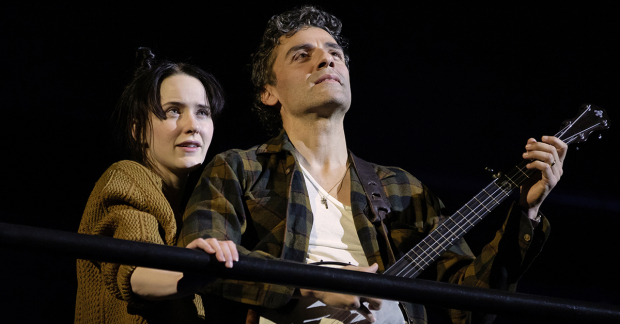Review: Oscar Isaac and Rachel Brosnahan in Lorraine Hansberry's Thrilling Sign in Sidney Brustein's Window
Hansberry’s eerily prescient, rarely seen 1964 drama returns to New York City for a major revival.

(© Julieta Cervantes)
Second plays are rarely as successful as first plays, but in the case of Lorraine Hansberry's The Sign in Sidney Brustein's Window, that's an understatement. Coming after her history-making success with A Raisin in the Sun, her sprawling drama about the dissolution of a marriage amid political corruption in Greenwich Village was a victim of its perilous situation: Hansberry, 34, was dying of pancreatic cancer as it was being produced on Broadway, and she was unable to make changes. Critics at the time probably weren't willing to give a fair shake to a Black dramatist's attempt to tell a universal story from the perspective of white characters. And so, The Sign in Sidney Brustein's Window got buried in the annals of history, not even surfacing in classrooms. Until now.
At Brooklyn Academy of Music's Harvey Theatre, director Anne Kauffman and producer David Binder are giving us an ultra-rare revival of The Sign, and it's one for the ages. Not just a production for the theatrical devotees among us, Kauffman's thrilling staging — led by the terrific Oscar Isaac and Rachel Brosnahan — brings Hansberry's words to life with the urgency of something written yesterday. Sure, it's a little hirsute (and at three full hours, extremely wearying), but the whole thing is just so alive that it's nothing short of dazzling.
Isaac is Sidney, a white, Jewish, liberal idealist in 1964 who has just closed an unsuccessful folk bar called Walden Pond and taken ownership of a community newspaper called The Village Crier. Sidney's search for meaning leaves his country-bred wife, Iris (Brosnahan), a would-be actor of Greek, Irish, and Cherokee descent, constantly in his crosshairs.
Their apartment (evocatively lit by John Torres and perilously designed by dots so it hangs almost five feet above the stage floor) is a gathering place for bohemian culture. Upstairs neighbor David (Glenn Fitzgerald, doing his best Albee impression) is a gay absurdist playwright on the verge of success. Their friend Alton (Julian De Niro, son of Robert) is a Black ex-Communist in love with Iris's sister Gloria (Gus Birney, daughter of Reed), who he doesn't know is a high-priced call girl (that Alton is Black and Gloria is a hooker is met with constant derision by Iris's other sister, Mavis, deliciously and unapologetically played by Miriam Silverman). The overwhelming arc of the play follows what happens when Sidney goes against his ambivalent nature and endorses reformist candidate Wally O'Hara (Andy Grotelueschen), who he doesn't know has been corrupted by the New York political machine.
Hansberry writes with the fervor of someone trying to get all her feelings out before it's too late; because of that (and the probable lack of edits due to her illness), The Sign has a shagginess it can't shake (the first act alone is 90 minutes, and the second act, which combines an original structure of Acts 2 and 3, is all over the place). But the warts are part of the charm, and it's just so exiting to realize that this 59-year-old play speaks to our current social climate with such effortlessness, as Hansberry dares her characters (and especially the audience) to confront their own actions and inactions, and the realization that we all can be bought and sold without considering the ramifications.
Kauffman's staging brims with the kind of vitality that allows the characters to jump off the dusty pages of an old Samuel French acting edition and into actual life. The supporting players are excellent (particularly Silverman and the so-fragile-you-can-break-her Birney), and Isaac and Brosnahan take on two exceptionally difficult roles with impressive skill. Brosnahan, lithe and wispy in Brenda Abbandandolo's '60s-chic costumes, does an impressive job of breaking out of Midge Maisel mode to portray a different kind of radical woman, caught between bringing her ranting husband a beer and paving her own path. Isaac, who barely leaves the stage, doesn't try to make the largely uncaring Sidney sympathetic; he gives us the kind of unabashed asshole you can't help but be drawn to and pushed away from. Together, he and Brosnahan are sexy as hell, with chemistry that is simply off the charts.
Celebrities of their stature could have chosen any play. Instead, they chose a challenging and relatively untested work to sink their teeth into, and they do so with relish. We are lucky not only because we get to see them do it, but we get to hear Hansberry's eerily prescient words, as they encourage us to get up and fight injustice. If that's not good enough to introduce it to the canon of great American literature, I don't know what is.









